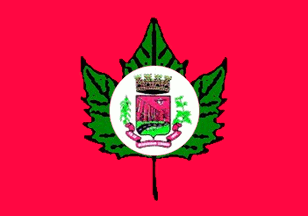 image by Dirk Schönberger,
4 May 2012
image by Dirk Schönberger,
4 May 2012Source: http://cid-57cc02038c003794.office.live.com/self.aspx/.Documents

Last modified: 2020-08-08 by ian macdonald
Keywords: rio grande do sul | vespasiano correa |
Links: FOTW homepage |
search |
disclaimer and copyright |
write us |
mirrors
 image by Dirk Schönberger,
4 May 2012
image by Dirk Schönberger,
4 May 2012
Source:
http://cid-57cc02038c003794.office.live.com/self.aspx/.Documents
The municipality of Vespasiano Corrêa (1,974 inhabitants in 2010; 11,500 ha)
is located 180 km of Porto Alegre.
Vespasiano Corrêa is named for
engineer Vespasiano Corrêa, Head of the Commission of Land and Colonization,
seated in Guaporé.
The municipality of Vespasiano Corrêa was established by
State Law No. 10,663 promulgated on 28 December 1995 and inaugurated on 1
January 1997.
https://www.vespasianocorrears.com.br/
Municipal website
Ivan Sache, 8 August 2020
A red flag with a large green maple leaf bearing the municipal arms in a white disk in the centre.
Official website at
http://vespasianocorrears.com.br
Dirk Schönberger, 4 May 2012
he flag of Vespasiano Corrêa is prescribed by Municipal Law No. 127
promulgated on 10 December 1997.
Article 1.
The flag of the
municipality of Vespasiano Corrêa has for official colors red, green and white
and is composed of three panels, inspired by an innovative format and the colors
of the flags of Portugal, Italy, Poland and Rio Grande do Sul, representing:
a) Red (gules) is the symbol of dedication, patriotic love, audacity,
intrepidity, courage and valiance.
b) Green (vert) is a symbol of honor,
civility, courtesy, glee, abundance and hope, since the mountains and greening
fields promise profuse harvests.
c) White is a symbol of peace, friendship,
integration, work and community's harmony.
Article 2.
The flag shall
obey the following rules.
I - The flag is composed of three panels: green,
white and red in usual shades, red forming a rectangle, green a maple leaf, and
white a circle placed over the green panel.
II - The flag shall bear in the
center a white panel featuring the municipal coat of arms.
III - The flag
shall bear a maple leaf, between units 5 and 16 until the central circle. The
petiole of the green leaf is placed exactly on unit 10 while the leaf's upper
tip reaches unit 1.
Article 3.
The flag shall obey the following
features.
I - The flag's width shall be 14 units.
II - The flag's length
shall be 20 units.
III - The coat of arms shall have a width of 7 units,
leaving 3 units in the upper and lower parts.
https://leismunicipais.com.br/a/rs/v/vespasiano-correa/lei-ordinaria/1997/13/127/lei-ordinaria-n-127-1997-institui-a-bandeira-municipal-e-da-outras-providencias
Leis Municipais database
The coat of arms of Vespasiano Corrêa is
prescribed by Municipal Law No. 101 promulgated on 12 September 1997.
Article 1.
A classic French Latin shield, surmounted by a mural crown or with
six towers, four visible. in base on a field vert (green) symbolizing the
mountains and the plains the main road that crosses the municipality, lined with
maples and hydrangeas. In chief sinister, the symbol of food industry argent
(silver), representing work. In chief on a field gules (red) the big railway
viaduct or (gold), symbol of the buildings representing architecture,
engineering and historical heritage. The shield supported dexter and sinister by
tobacco and maize plants all proper. Beneath the shield a scroll gules (red)
containing in argent the toponym "Vespasiano Corrêa" surrounded by dates "28/12"
and year "1995".
The coat of arms has the following symbolic
interpretation.
a) The classic French shield used to represent the arms of
Vespasiano Corrêa, originates from France and was introduced all over Europe
during the struggle against the Romans and the Barbarians, being much later
adopted in Portugal, namely to represent domain's coats of arms, and,
eventually, adopted by Brazilian heraldry as the evocation of the colonizing
race and builder of the nation.
b) The crown that surmounts it is the
universal symbol of coats of arms of domains. Or with six towers, four visible
in perspective, it classifies a 3rd rank ton, seat of a municipality.
c)
Argent (silver) is a symbol of peace, friendship, work, prosperity, purity and
religious feeling.
d) The shield features in the center the main road that
crosses the municipality, of ecological and tourism value. The green field is
broken by maples and hydrangeas that represent beauty and manpower of farmers
and colonists of the municipality.
e) In chief sinister argent (silver), the
symbol of food industry, recalling the potential of increase of agriculture and
economical activities in this important sector of production.
f) Vert (green)
is a symbol of honor, civility, courtesy, glee, abundance and hope, since
mountains and greening fields promise profuse harvests.
g) In chief on a
field gules (red) is featured the symbol of engineering, culture, union,
solidarity, friendship and persistence of the community during the political
emancipation, through the railway viaduct or (gold). The bridge's greatness
conveys feelings of peace and community's harmony during the significant
historical and cultural event that ennobled the citizens of Vespasiano Corrêa,
emancipation.
h) Red (gules) is a symbol of dedication, patriotic love,
audacity, intrepidity, courage and valiance. Or (gold) is a symbol of royalty,
celebrity, splendor, greatness, command, force, wealth and sovereignty.
i)
The outer ornaments recall the main products of the generous and fertile soil,
tobacco and maize.
j) A scroll gules (red) is inscribed in letters argent the
toponym "Vespasiano Corrêa" surrounded by dates "28/12", the day and month of
creation of the municipality, and "1995", the year of political emancipation.
https://leismunicipais.com.br/a/rs/v/vespasiano-correa/lei-ordinaria/1997/11/101/lei-ordinaria-n-101-1997-institui-o-brasao-municipal-e-da-outras-providencias
Leis Municipais database
Viaduct 13, aka Army's Viaduct, was built by
the 1st Railway Battalion and inaugurated on 19 August 1978. At 143 m in height,
the viaduct is America's first and world's second highest viaduct. The local
legend claims that two Brazilian soldiers killed during the viaduct's erection
were buried inside one of the viaduct's piles.
https://www.penaestrada.blog.br/viaduto-13-o-mais-alto-das-americas/
Péna Estrada, 26 February 2018
Ivan Sache, 8 August 2020